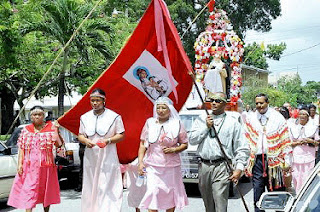 Photo of the Carib section of the procession for the August 26, 2007, Santa Rosa Festival in Arima. Holding the banner is Cristo Adonis, and behind him is Ricardo Bharath Hernandez.
Photo of the Carib section of the procession for the August 26, 2007, Santa Rosa Festival in Arima. Holding the banner is Cristo Adonis, and behind him is Ricardo Bharath Hernandez.For last year's Santa Rosa Festival, I wrote one main essay on what transpired at the event, and I can say I will not be doing an encore. I wanted only to bring attention to some aspects that were salient to me, and once again I was fortunate to have listened to the complete proceedings over the Internet on I95.5 FM.
The proceedings for this year seemed to transpire at a rapid pace, and even the radio coverage was one hour shorter than last year's, with the radio announcer seemingly in a big hurry to get to the next program. The chief celebrant was the Papal Nuncio to the Antilles, which is an interesting choice given the degree of outrage expressed by indigenous persons across the Americas over the Pope's recent remarks that criticized indigenous religious revivals, while praising the purifying role of the Catholic Church. The main theme of this year's event appeared to be "social justice." The radio narrators themselves spoken solemnly, and quoted heavily from the mid-19th century text by L.A.A. De Verteuil, where he spoke of Santa Rosa festivals he had witnessed as a youth. The radio narrators were impressed with the degree of continuity, a comment unfortunately made right after a quote from De Verteuil that on this day the Amerindians would forget their servitude.
What was also striking is the amount of resources and organization invested by the Church in this event: a medical vehicle to follow the procession, police and marshals, water stations for those on the procession, and of course the media coverage itself, the giant flat screen used to convey the mass to those outside of the church, and so forth.
Also of interest to me is that the order of the procession has been changed in recent years. The Carib Community was once third in line, behind the acolytes, and behind the priests and members of the Arima Borough Council. Now only the acolytes lead, followed by the Carib Queen, followed by the Carib Community, then followed by the rest. Why this has changed is an interesting question, and one can speculate that past discussions, and critical comments, sometimes made in the presence of those connected to the church, could have had some impact.
For those interested in hearing the English language portion of Ricardo Bharath's very interesting prayer at the mass, please click here (opens a new window).
The website of the Santa Rosa Carib Community can be accessed by clicking here (also opens a new window).
----
No comments:
Post a Comment